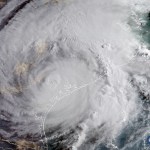infrastructure
Hurricane Harvey visited a near-biblical deluge upon Houston, dropping over 40 inches of rain on parts of the city. The situation resulted from warmer ocean waters, more moisture in the atmosphere, and Houston's geography along with its preparedness for the disaster. Greg Laden shows hotter sea surface temperatures in the Tropics and the Gulf of Mexico allowed Harvey to gain extra strength as it formed and re-formed on its way to the United States. In another post, Greg asks if Houston's infrastructure could have been better-prepared for this type of rainfall, suggesting that "Houston is…
On Class M, James Hrynyshyn shows us how climate change will benefit the economies of some U.S. counties while damaging many others. This mostly has to do with location; coastal areas and southern latitudes are more threatened, with Florida poised to suffer worst of all. James writes, "we're not just talking about polar bears anymore. It's now about jobs, wages, infrastructure, crime." Meanwhile, William M. Connolley reports Antarctica's Larsen C ice shelf is 12% smaller due to a giant iceberg splitting off and heading (presumably) toward Miami. Greg Laden says denial of global warming has…
If you only have time for one long read this week, make it the excellent "Breathless and Burdened" series by Chris Hamby of the Center for Public Integrity. The series website explains, "This yearlong investigation examines how doctors and lawyers, working at the behest of the coal industry, have helped defeat the benefits claims of miners sick and dying of black lung, even as disease rates are on the rise and an increasing number of miners are turning to a system that was supposed to help alleviate their suffering." This is investigative reporting at its finest!
Other recent pieces I've…
(Awesome image of zombie me by Joseph Hewitt of Ataraxia Theatre and the originator of the cool RPG Gearhead Check out my fellow bloggers to see their zombie pix! I wonder if New Society would let me use this as my book jacket photo for the new book?)
As all of you obviously know, July 1 is International Zombie Day - celebrated around the world by the zombifying oneself, posting brain recipes, strategies for fightin' em off, etc... Well, ok, it is kind of a new, science-blogs-only-holiday so far (credit for the idea goes to Scicurious!), but following the stunning success of international…
tags: The Story of Astoria Scum River Bridge, grassroots activism, citizen activism, Hell Gate Bridge viaduct, Astoria Scum River Bridge, infrastructure, unauthorized city improvement, Amtrack, New York City, NYC Life, Jason Eppink, Posterchild, streaming video
This is a wonderfully produced video documenting a true story of creative citizen activism designed to protect the safety of the neighbors in the Astoria neighborhood of Queens, NYC.
Astoria Scum River Bridge is an unauthorized city improvement by Jason Eppink and Posterchild.
For more than twenty years, a leaky pipe on 33rd Street…
I'm sitting here in the dark and freezing. No, not really. It's not dark yet and it's hot and humid. But I have no power, except what's left in this laptop. Can't connect to the net because I use wifi at home and the router is electrical (if I get really desperate I'll crawl up to the study and huddle in back of my desk and connect with ethernet but I don't think even I am that much of a slave to being online. Actually I am, but I'm too tired). So what happened?
Mrs. R. and I are sitting here together, each of us reading, on a very warm, sort of sunny Sunday afternoon and we hear a tremendous…
Everyone has heard by now that there is a catastrophic oil leak in the Gulf of Mexico. I'm not an oil expert, so I won't discuss this much here. There is a lot of information already in the media. I am quite familiar with drinking water issues, however, and over the weekend we received news of another catastrophic leak, this one affecting the Boston Metropolitan area. Several million people there are now under a "boil water" order because a section of steel pipe bringing water from its main surface supplies tens of miles to the west of Boston and surrounding communities blew out and the main…
Once, long ago, I used to be in a radiology department in a famous hospital. I liked radiology quite a bit and even before becoming a doctor I worked in them. Later I did research on the kinds of errors radiologists make when they read x-rays. One of the errors that was extremely well known even 40 plus years ago (although that didn't prevent it from being made with dismaying consistency up to and including today) was something called "satisfaction of search error." In essence, it meant that once one abnormality was found on an x-ray, there was an increased chance of missing a second,…
The Icelandic volcanic eruption is still causing havoc in Europe with ripple effects elsewhere as people and planes are grounded for travel in or out of much of northern Europe. Pressure from the traveling public, air carriers and business is mounting to let passenger and cargo planes fly again. What's changed? Not much. There's about as much uncertainty as there was a week ago, just a lot more pushback. The recriminations are already starting: EU and national transport authorities "over reacted." They should have ... done what? At the same time airlines like Air France-KLM are conducting…
Last Sunday's New York Times had an article about the shortage of slaughterhouses for those raising non-industrial and local meat.
According to the United States Department of Agriculture, the number of slaughterhouses nationwide declined to 809 in 2008 from 1,211 in 1992, while the number of small farmers has increased by 108,000 in the past five years.
Fewer slaughterhouses to process local meat means less of it in butcher shops, grocery stores and restaurants. Chefs throughout the Northeast are partnering with farms to add locally-raised meat to their menus, satisfying a customer demand.…
There is so much tragedy and sadness in the wake of the earthquakes in Haiti and Chile that to bemoan the fate of research projects there seems kind of trivial. But if you are scientist your heart really goes out to your Chilean colleagues. Jocelyn Kaiser and Antonio Regalado have some details at ScienceInsider, Science Magazine's science blog:
Scientists at research universities in several Chilean cities are reeling from last week's earthquake, which overturned microscopes, set fire to laboratories, washed years of research out to sea, and took the life of a young marine biologist.…
Congratulations, North Carolina. You are getting brand new $52 million facility for your State Public Health Laboratory and Office of the Chief Medical Examiner, each in separate wings of a 220,000 square foot facility in Raleigh. Sounds great. But if you work there you might want to shower at home and bring bottled water. And better check your benefits. Because the company that got the contract is non other than Kellogg Brown & Root (KBR), until recently a Halliburton subsidiary and notorious Iraq contractor under investigation for shoddy electrical work resulting in the electrocution…
So far the pandemic of 2009 has been bad enough but not anywhere near as bad as one could imagine. Let's hope it stays that way. While winning new knowledge from actual disease and sickness is not anyone's favorite strategy, it is likely we will learn a great deal about influenza in the years to come as we begin to mine the wealth of data it is producing. Science, even at its most urgent, is still a slow, methodical process, but this pandemic and the resources devoted to tracking it and the tools being developed to analyze it is a watershed event in flu science. Dogmas will fall and probably…
I'm an epidemiologist and I train epidemiologists so you expect me to think epidemiology is important to public health. Epidemiology describes the pattern of diseases in the community and tries to figure out why some patterns exist and not others. It is used for both applied health research (causes of disease and disease outbreaks), disease control and for administrative purposes (how many hospital beds will we need, for example). When I was in medical school most epidemiology, such as there was, was done by medical doctors or employees of federal, state and local health departments. Starting…
We complain when there isn't enough swine flu vaccine and we complain when our health departments don't count all the cases. It's probably good so many people are out of work and can't eat in restaurants, because they aren't getting inspected because all available staff are trying to deal with the flu pandemic:
The current swine-flu wave may have peaked, but thousands of public health workers are trying to vaccinate millions of people against the new disease, fearing that another wave could emerge in the new year. Yet recession-driven budget cuts have thinned their ranks so far that they are…
The online publication of three papers and a commentary yesterday in the Journal of the American Medical Association (JAMA; free access, links at bottom of post) provides some further data on what demand for critical care resources might be from the current swine flu pandemic. One paper reports on the Mexican experience, where mortality seemed unusually high but where access to services may have made the outcome worse. The papers from Canada are perhaps most pertinent to what might be experienced in the US and Europe. It appears that in terms of demand for ICU beds, the first wave from last…
We don't usually think of power outages as an important cause of poisoning but it is. Electrical power has become such a necessary part of basic needs -- think of light at night and refrigeration -- that if it is interrupted for more than a few hours people will turn to gasoline powered generators to provide it. Apparently, though, the fridge and the light bulb are not the only necessities. Experience with recent disasters is revealing that people have new kinds of imperatives:
Hours after Hurricane Ike roared ashore in Texas, more than two million homes were without power, which left some…
Yesterday DemFromCT had another in his continuing series at DailyKos on Flu and You (Part VIII). He extended an earlier post (part II) on a critical piece of public health infrastructure, laboratory surveillance. One of the graphics is this chart of influenza positive tests reported to the CDC by the WHO/NREVSS collaborating laboratories:
What you see in this chart is a weekly record of what seasonal influenza types and subtypes are circulating in the community (influenza A/H1N1, A/H3N2, B; swine flu makes a late appearance, far right). Flu seasons differ on dominant subtypes, whether they…
Laurie Garrett of the Council on Foreign Relations and a well-known authority on emerging infectious diseases was on PBS's Newshour last night and she made a very important but little appreciated point. Mexico has made a major national sacrifice for global public health by shutting down its country and interrupting transmission of disease. The cost to Mexico has already been enormous it will continue to pay in other ways. The reputation of the government has suffered because of the way it handled this -- the lack of transparency, the initial slow footedness (which of course it denies), its…
There is a tendency to be preoccupied with the latest in fast moving events, but I want to pause for a moment to make a point that has been lost in the discussion: we are witnessing a medical science landmark. Never before have we watched a flu outbreak of global dimensions unfold in real time. Nor have we ever had the opportunity to alter the course of such an outbreak.
I have been critical of WHO for being late to the party, but they are fully on board now and by raising the pandemic threat level to phase 5 have done something very important: served notice that it's time to mobilize…


